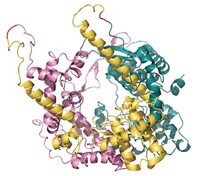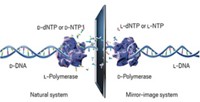Advertisement
Grab your lab coat. Let's get started
Welcome!
Welcome!
Create an account below to get 6 C&EN articles per month, receive newsletters and more - all free.
It seems this is your first time logging in online. Please enter the following information to continue.
As an ACS member you automatically get access to this site. All we need is few more details to create your reading experience.
Not you? Sign in with a different account.
Not you? Sign in with a different account.
ERROR 1
ERROR 1
ERROR 2
ERROR 2
ERROR 2
ERROR 2
ERROR 2
Password and Confirm password must match.
If you have an ACS member number, please enter it here so we can link this account to your membership. (optional)
ERROR 2
ACS values your privacy. By submitting your information, you are gaining access to C&EN and subscribing to our weekly newsletter. We use the information you provide to make your reading experience better, and we will never sell your data to third party members.
Biological Chemistry
RNA-based enzyme synthesizes various RNA structures
Ribozyme amplifies RNA in an RNA-only version of the polymerase chain reaction
by Celia Henry Arnaud
August 21, 2016
| A version of this story appeared in
Volume 94, Issue 33
The ability to produce many types of RNA molecules without the help of protein enzymes would have been necessary if early forms of life were based on RNA, which is a popular hypothesis. Gerald F. Joyce and David P. Horning of Scripps Research Institute, in La Jolla, Calif., have now identified a ribozyme—an RNA-based enzyme—that can replicate a wide variety of RNA molecules and can even catalyze an all-RNA version of the polymerase chain reaction (PCR) used to amplify genetic material (Proc. Natl. Acad. Sci. USA 2016, DOI: 10.1073/pnas.1610103113). The ribozyme was singled out after 24 rounds of in vitro evolution starting from an engineered form of the class I polymerase ribozyme. In each round of evolution, ribozymes were selected for their ability to synthesize ligand-binding RNA molecules called aptamers from complementary RNA templates. The evolved ribozyme synthesizes RNA molecules about 100 times as fast as the starting ribozyme and is able to synthesize sequences that stymie the original one. The evolved ribozyme synthesized a variety of highly structured RNA molecules with different functions, including aptamers, other ribozymes, and transfer RNA, the kind of RNA used in protein synthesis. The evolved enzyme is even able to exponentially amplify short RNA templates, albeit at low yields, in an RNA-only version of PCR.




Join the conversation
Contact the reporter
Submit a Letter to the Editor for publication
Engage with us on Twitter